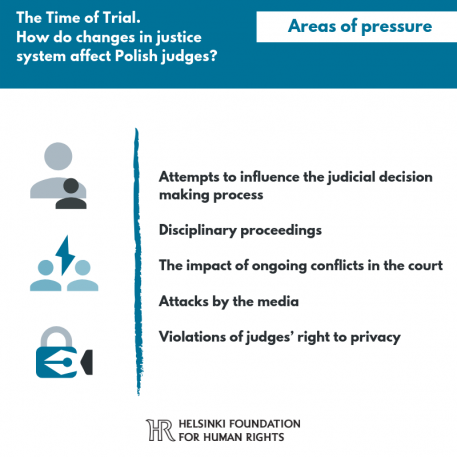
HFHR’s report: The Time of Trial. How do changes in justice system affect Polish judges?
Changes in justice system introduced over the last four years are used, to a large extent, to increase pressure on judges, the HFHR’s study “The Time of Trial. How do changes in justice system affect Polish judges?” shows. The study identified five main forms of the pressure currently being exerted on judges: attempts to influence the judicial decision making process, disciplinary proceedings, the impact of ongoing conflicts in the court, attacks by the media and violations of judges’ right to privacy.
HFHR’s study
From February to July 2019 the HFHR’s lawyers interviewed 40 judges from 26 courts in 15 cities in Poland. The interviewees were first and foremost the front-line judges from courts of all instances (from district to appellate courts). The conducted surveys tackled mainly the pressure experienced by judges, current situation concerning the judiciary and the respondents’ assessment of changes implemented in the judicial system.
Five areas of pressure
“Owing to the study, we have identified five areas in which judges encounter various forms of pressure. 24 out of 40 respondents indicated that they had experienced at least one form of pressure. These experiences escalated with changes in the judiciary, introduced in last four years”, says Małgorzata Szuleka, the report’s co-author.
None of our respondents stated that anyone has ever attempted to force them to make a certain decision. That does not mean, however, that the judicial decision making process is free from any pressure. Judges indicated, for instance, examples of conduct of courts’ authorities or politicians amounting to interference with this process. The general aura around courts and judges and the constantly growing threat of disciplinary proceedings (both factors enhancing the chilling effect among judges) were, certainly, not without significance, too.
“I’ve heard my colleagues warning me: you shouldn’t do this, or you’ll be disciplined”, said one of the surveyed judges. According to 11 respondents, the chilling effect can have impact on adjudicating. Moreover, the interviewees pointed out that it influences also their public activities.
The respondents also referred to numerous attacks by public and right-wing media as one of the main sources of pressure. In this context, a certain anonymous Twitter account addressing particular judges plays a vital role. Based on the access of this account’s authors to classified materials from e.g. courts, suspicions have arisen concerning a close cooperation with the Ministry of Justice.
Assessment of changes in justice system
The report also indicates that surveyed judges are very critical of changes implemented in justice system.
In particular, the negative attitude of judges to the new National Council of the Judiciary was evident. “None of our respondents took into consideration the possibility of turning to the new National Council of the Judiciary for help in case they are attacked or applying for a promotion in procedure governed by the Council”, says Marcin Wolny, the report’s co-author. The negative assessment of the NCJ was mainly influenced by the selection mode of new judge-members of the Council, its composition and standards of its functioning.
The respondents were also equivocally critical of the functioning of the Constitutional Tribunal after 2016. None of the surveyed judges would refer a question of law to the Tribunal. This is primarily accounted for the lack of certainty regarding the validity of judgements delivered by improper panels of the Tribunal.
Current situation in courts
The report refers also to the current situation in courts. “None of the changes introduced in justice system in last years has led to expediting the functioning of courts”, says Maciej Kalisz, the report’s co-author. To make the matters worse, in many courts changes of presidents have contributed to internal conflicts and antagonizing judges.
Moreover, the respondents criticised the functioning of the system of random allocation of cases. Although the majority of surveyed judges praised the very idea of the system, they found its implementation hampering the judicial work. Serious doubts were also raised regarding the transparency of the system – in one of the courts the HFHR’s researcher was given a copy of the president’s note requesting that a certain case be assigned to a particular judge.
The matter of court clerks has also been raised in the report. The surveyed judges indicated that, in particular, their workload combined with low salaries have a negative influence on the effectiveness of judges’ work.
“Any lucidly-thinking judge who has a tiniest clue about this job will say the same thing I’ve been saying: the current reforms have nothing to do with improving the work of the judiciary. Nothing at all. I’m talking about the quality of working environment and the social perception of our work”, says one of the interviewed judges.
The report is available here.


24.07.2019
 Cookies EN
Cookies EN